Even before “social distancing” entered our vocabulary and face masks became a mandatory accessory, businesses were changing. In an analysis of the Deloitte Human Capital Trends of 2018, Forbes found that 77% of surveyed companies rated “citizenship and social impact” among their top priorities. Additionally, 65% of companies ranked “inclusive growth” among their top three business goals, which edged out more traditional missions such as increasing market share.
Now, experts expect the post-pandemic business landscape to be permanently altered. Juliet Aiken, Ph.D., the program director of the Industrial and Organizational Psychology Masters in Professional Studies at the University of Maryland, expects to see a rise in social entrepreneurship in the wake of the pandemic. She attributes the rise to the opportunity to pursue self-actualization and increased engagement with the global community. “We have this obsession right now in America with the idea of meaningful work,” she says. “We’ve had these things [the pandemic] that have exacerbated the systemic inequities and drawn light to them. We see continued aggressions, and then, at some point, the dam breaks.”
Other movements and events continue to widen that break: the rise of the #MeToo movement, the global environmental crisis, and the historic and continued inequities and aggressions against Black Americans, including the recent murder of George Floyd by Derek Chauvin, a white Minneapolis police officer. Floyd’s death resulted in street demonstrations across the world, inspiring many businesses to address institutional racism, including Away, Glossier, and Etsy.
As businesses pivot to address global and national issues and challenges so too are the people who start them. These five social entrepreneurs serve as examples of a professional pivot, highlighting how injustice can prompt a person to dedicate their career to social change.
Corey Ponder: From the CIA and Facebook to Em|PACT Strategies
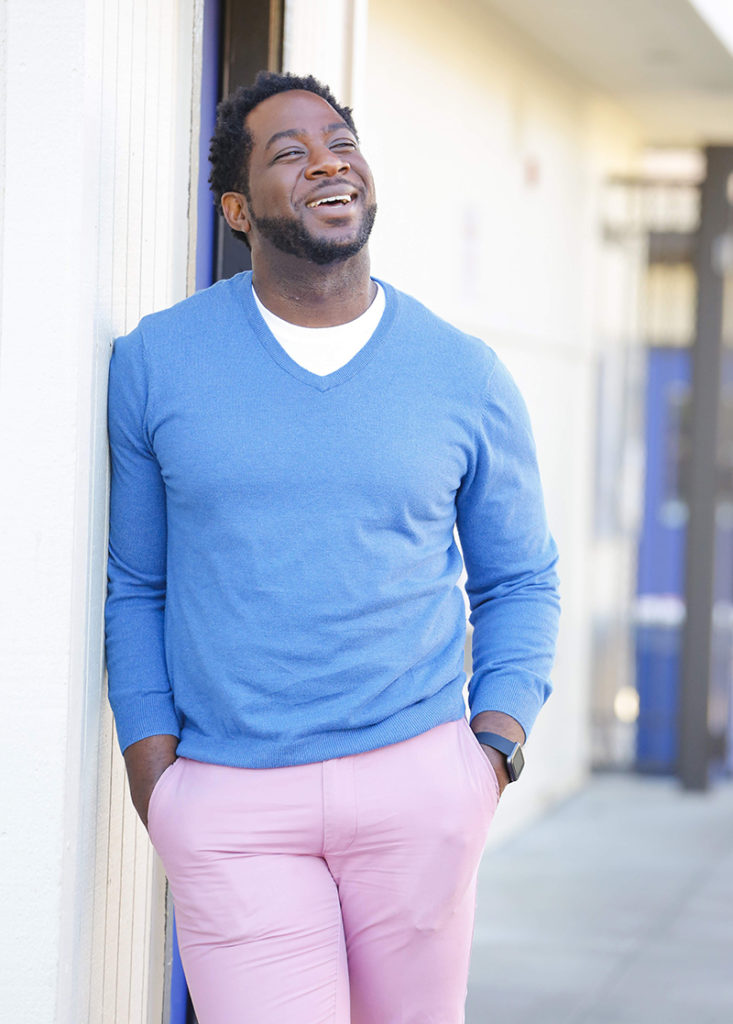
After a cathartic conversation with his manager at Facebook about the murders of Alton Sterling and Philando Castile, Corey Ponder created Em|PACT Strategies with the goal of fostering workplace empathy. (Photo by Jinah Manly)
Looking back, Corey Ponder recognizes he unconsciously led himself down the path of public service. He was always active in his community, he recognized the importance of activism, and he thrived in environments that allowed him to identify and solve problems.
At first, this drew him to the medical field. Ponder enrolled in the pre-med program at Vanderbilt University, but he continued to foster his interest in politics and public policy. In the summer of 2005, Ponder participated in a study abroad program in London. Initially intrigued by the city’s culture and the intricacies of British politics, he did not expect his time abroad to change the trajectory of his life.
However, on July 7, 2005, a series of coordinated bombings occurred across London’s public transportation system, killing 56 people and injuring 784. While unharmed, the 7/7 bombings encouraged Ponder to change his focus. “The implications of that attack really showed me that these large geopolitical and international foreign policy conversations impact people’s day to day,” he says, “and the decisions governments and other entities are making actually do touch people, even if we feel we are removed from them.”
Ponder returned to Vanderbilt and changed his major to political science. He finished his program in 2007 and immediately moved on to UC Berkeley, where he earned a master’s in public policy. Then, he began a six-year career as an analyst at the CIA where he focused on the political climates of Pakistan, Afghanistan, and Central and East Africa.
However, Ponder is not one to stay in a place for too long. He worked for several other government and non-profit organizations, including the Department of Homeland Security and the Congressional Budget Office, before deciding to take his skills to the private sector. He worked as a product specialist with Facebook, an experience that demonstrated to him technology’s ability to impact public policy. During his time at Facebook, another news event prompted Ponder to change his life again. On July 5, 2016, police officers in Baton Rouge, Louisiana, murdered Alton Sterling, a Black man. The next day, another Black man named Philando Castile, was murdered by police in St. Anthony, Minnesota. Their deaths struck Ponder not only because he, too, was a Black man in America, but because Sterling and Castile were murdered while they went about their daily lives.
Following the murders, Ponder remembers having a conversation with one of his managers at Facebook. “One of my managers actually [showed] me a lot of empathy and made space for me to share and understand my feelings,” he says. “This really made me feel like I could bring my entire self into a space.” That exchange made Ponder realize the importance of an open and empathetic work environment. It also informed the creation of Em|PACT Strategies, which delivers content that helps employers construct communities that become spaces of support. Ponder and his team host speaking engagements and workshops to help companies and organizations develop more inclusive environments.
Ponder describes himself as “risk averse,” and he understands why others with non-business backgrounds might be nervous to launch their own social enterprise. While he recognizes the logistics are instrumental for a venture to succeed, he assures aspiring social entrepreneurs that collaborative skills and the mission behind the business are equally important.
Ponder also assures that there is no shame in changing aspects of your business later. “I’ve redesigned my website several times,” he says. “I’ve honed my services several times because I have described myself several different ways largely because of the experiences that I’ve had.” He encourages aspiring social entrepreneurs to take things one day at a time and to build a network of supporters and mentors who can offer guidance and encouragement. “I know there’s some things you have to focus on, like future planning, but really focus on today,” he says. “Do what you can today.”
Suzanne Meriden: From corporate retail to the Syrian American Council
For corporate retail manager Suzanne Meriden, the Syrian Revolution, which began in March 2011, served as her social disruptor. She could not stop checking her phone, glued to the unending stream of notifications providing updates on the war. Meriden found herself more dedicated to following the news than to her duties at her job, and she could not keep her mind away from the destruction ravaging her ancestral homeland. “I was just drawn to it. It wasn’t even a conscious decision,” she says.
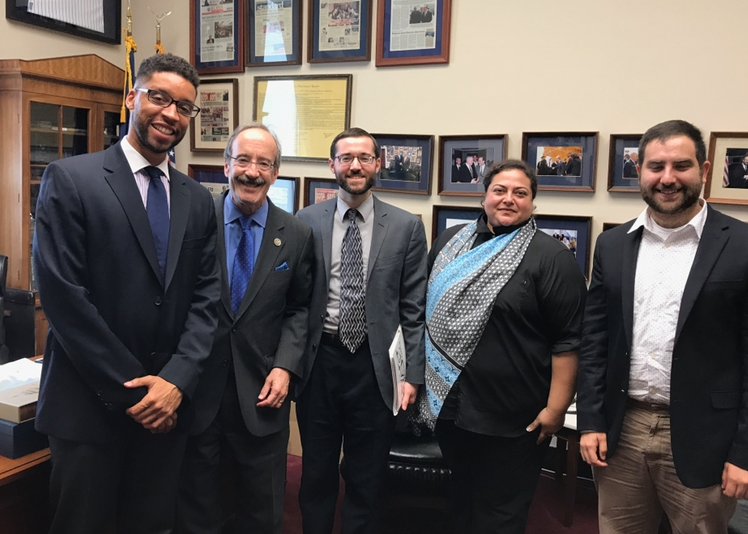
“Advocacy, in general, is very different from humanitarian work, because humanitarian work is tangible,” says Suzanne Meriden, executive director of the Syrian American Council, meeting here with U.S. Rep. Eliot Engel (D-N.Y.), chairman of the House Foreign Affairs Committee. (Photo courtesy of Suzanne Meriden)
Having saved enough money to volunteer full-time for at least a year, Meriden decided to leave her position as a corporate operations manager at Aki-Home, a furniture company, to pursue advocacy. At first, her parents worried. Her father supported the cause, but he feared the dictatorial regime would retaliate against family members who remained in Syria. Despite her father’s concerns, Meriden began volunteering at the Syrian American Council’s (SAC) Los Angeles chapter. Then, in 2015, she moved to the organization’s Washington, D.C. headquarters to be the director of operations. Three years later, she became the executive director.
Meriden holds a bachelor’s degree in international business from California State University. She says that, ironically, the “international” portion of her education takes a backseat in her current work. Instead, she relies more on her interpersonal management experiences because in human rights advocacy, emotions run high.
Collaborating with people is one of Meriden’s favorite parts of her job, and it’s also a vehicle for her to make visible social change. “Advocacy, in general, is very different from humanitarian work, because humanitarian work is tangible,” Meriden says. “In advocacy, it’s not as tangible. It’s a concept. You work hard for many years to try to achieve one thing, not knowing whether you’re even going to achieve it.”
Meriden remembers the Caesar Syria Civilian Protection Act as one such concept that solidified her confidence in her decision to change careers. The act, named for a former Assad regime photographer who fled to the U.S. in 2014 with photographic evidence of human rights violations, imposes sanctions on any country that provides goods or services to the regime. In 2019, the bill passed in the House of Representatives. SAC and other organizations continue to advocate for passage of the bill into law. “Being part of a project like that, that took so long but needed everyone, that was one of my favorite parts of SAC,” Meriden says.
She encourages anyone interested in changing to a career driven by social change to listen to their inner voice and take the plunge. “Make sure this is something you love doing,” Meriden says. “Because it’s 24/7.”
Despite the risks Meriden took leaving a well-paying job for a life of intangible victories, she remains happy with her decision. “I went with my gut feeling that told me I needed to be in this field, I needed to work on this cause,” she says. “I couldn’t imagine being anywhere else.”
Kenan Rahmani: From Amazon to the Syria Campaign
Kenan Rahmani was an intern at Amazon when he realized he needed to do something different. Despite landing an internship at one of the top-grossing companies in the world, he wasn’t satisfied. Rahmani wanted to make a difference. “To be honest with you, I don’t know exactly how it happened,” he says. “Conventional wisdom is that you find a career in what you studied. But it’s possible to build a career out of anything.”
Rahmani graduated from Purdue University in 2009 after completing a bachelor’s degree in computer science in just two years. He quickly found work after graduation, but not as a programmer or software engineer. He co-founded BRIDGE Generations, a non-profit organization in Indianapolis that ran programs for at-risk youth, single mothers, and other marginalized populations. BRIDGE ran until 2011. Then, with the onset of the Arab Spring, Rahmani changed directions.
“I was obsessed with the street protests in the beginning of the Arab Spring. Not just in Syria, but across the Middle East,” Rahmani says. “It was very fascinating to me, and I started seeking out different organizations and activists that were really involved at the time.”
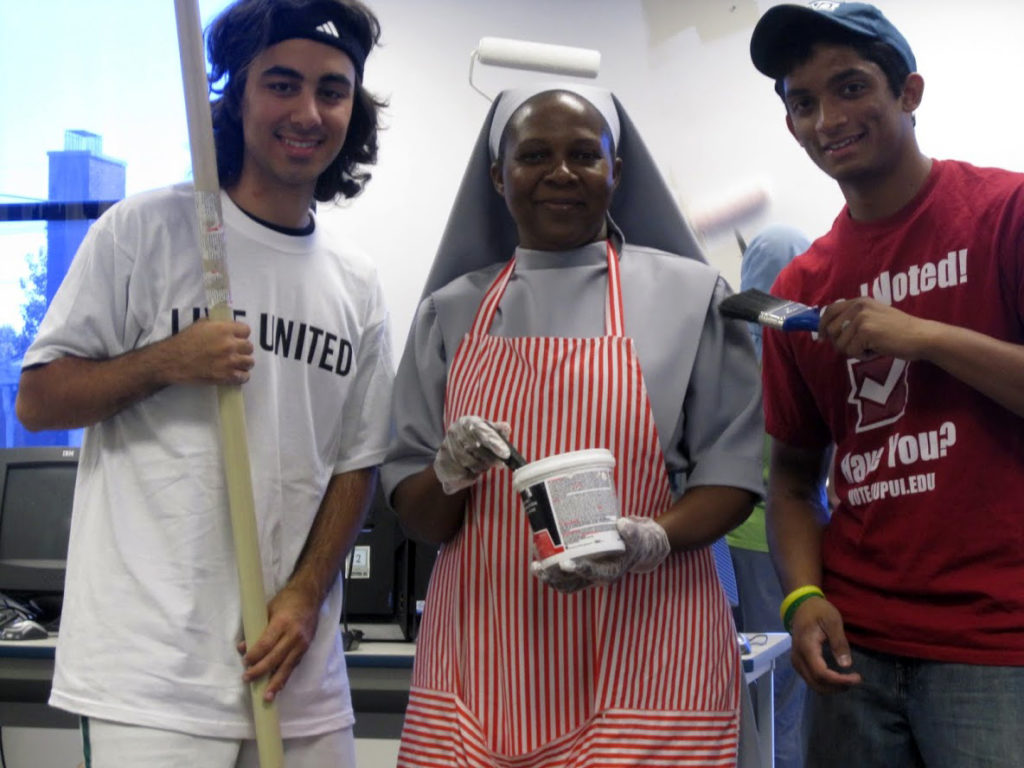
Kenan Rahmani (left) participates in the United Way Day of Caring Project to help repaint walls at the St. Philip Neri School in Indianapolis during his work with BRIDGE. (Photo courtesy of Kenan Rahmani)
Rahmani worked with numerous organizations in the U.S. and Syria during the first several years of the revolution, including the White Helmets and the Syrian American Council. Alongside other activists, Rahmani traversed the war-torn country and witnessed widespread suffering and destruction. “It was life-changing,” he says. “It’s difficult for regular Americans to understand what that world is like because it really does feel like a totally different world.”
While his hands-on humanitarian work at schools and refugee camps altered his worldview, Rahmani realized that for him, advocacy and lobbying offered more meaningful ways to contribute his skills. He then earned a law degree and a master’s in international relations and affairs from American University. Since 2016, he has worked as the advocacy manager at the Syria Campaign and a lobbyist with Americans for a Free Syria.
Despite the risks that come with humanitarian work — kidnapping, arrest, and death — the small victories propel Rahmani forward. “The most rewarding part of my work is being able to see these really incredible Syrian activists, frontline workers, and humanitarians whom I’m able to support behind the scenes,” Rahmani says. “And being able to give people a voice when they feel like they’ve been totally abandoned by the world feels really good.”
Rahmani believes a degree does not dictate a person’s career. While he applies skills such as analytical thinking and international expertise to his current work, he believes that social entrepreneurs shouldn’t underestimate the value of learning through experience. “[Humanitarian work] is something I don’t think any education can prepare you for,” he says. “[My education] fed into my work in different ways, but I would say I’m mostly self-taught and learned from other people.”
Lina Sergie Attar: From professor to Karam Foundation
Lina Sergie Attar, the CEO and co-founder of Karam Foundation, changed her career trajectory to further the Syrian cause. Sergie Attar holds three degrees in architecture — a bachelor’s from the University of Aleppo in Syria, a master’s from the Rhode Island School of Design, and a master’s in the history of Islamic architecture from the Massachusetts Institute of Technology — but has never worked as an architect. In 2008, while teaching design courses at a community college in Chicago, Attar, who grew up between Aleppo and Brooklyn, decided to start her own non-profit organization. Karam, which started small, focused on helping underserved groups in the Chicago area. “Karam means ‘generosity’ in Arabic, so it was all about giving back to the community,” she says. And when war broke out in Syria, the organization went international.
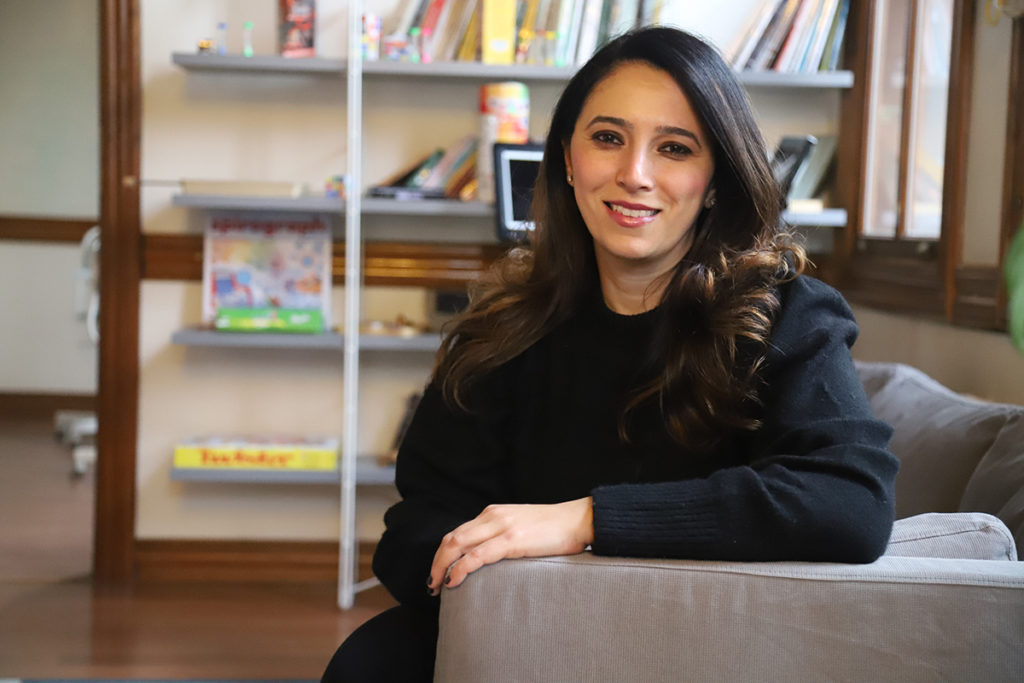
Lina Sergie Attar, the founder of Karam Foundation, originally created the organization to give back to underserved groups in Chicago. Now, the organization serves an international community with a focus on teenage refugees. (Photo courtesy of Lina Sergie Attar)
Attar did not view her inexperience in the humanitarian field as a disadvantage. In fact, she felt the opposite. “I felt that we could always bring something to the space that wasn’t there before because we were outsiders,” she says. “I would see large humanitarian organizations and agencies make massive fumbles and not consider the community they served. We were coming as outsiders, and we were seeing things differently.”
For Attar, promoting change is a civic responsibility regardless of educational background. “I think it’s really important for everybody to have a portion of their working lives be about volunteering and giving back to something that you’re passionate about,” she says, “because the world needs a lot of help in different areas.”
Kate Brodock: From tech start-ups to Women 2.0
Others did not need a push from a social disruptor. For some, social entrepreneurship was something they always aspired to do. This is true for Kate Brodock, who graduated from the University of Rochester with a degree in history. She knew she wanted a career centered around social change, but did not want to work for a non-profit or a massive international body like the United Nations. “They’re big and clunky,” she says. “I don’t do well with what I perceive to be layers of unnecessary red tape.”
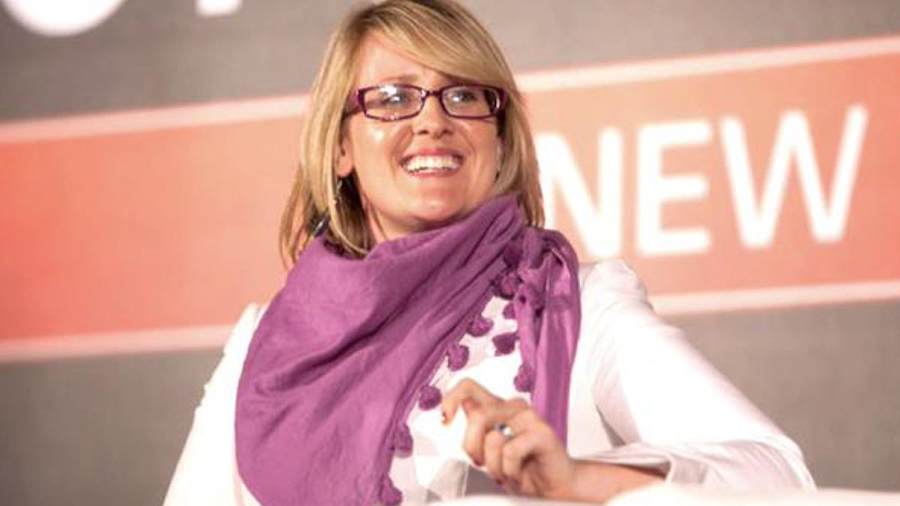
After running a global non-profit, Women 2.0 CEO Kate Brodock saw the benefits of giving back through for-profit social enterprises. (Photo courtesy of Kate Brodock)
Brodock landed her first job at a tech start-up in Cambridge, Massachusetts, where she discovered her passion: supporting women in technology and entrepreneurship. “I feel very strongly about humans. I feel very strongly about humans who don’t have equal opportunities,” Brodock says. She worked more in the start-up ecosystem before moving on to run a global non-profit. While she promoted change, she spent the majority of her time applying for grants and gathering donations. She appreciated the opportunity to help others, but wanted to be on the ground level of change, unfettered by fundraising and bureaucracy.
Brodock is a passionate supporter of the social-enterprise business model. She does not believe that change-driven ventures have to be lumped in with non-profits, and that making money allows an organization to make a bigger impact. “I think that many non-profits out there actually should be functioning as social enterprises,” she says.
Brodock decided to combine her passion for equality with her interest in business and returned to school for a master of business administration and a master’s in international relations. While working in social media marketing, she came across a life-changing opportunity. One of Brodock’s colleagues, who founded Women 2.0, “a media and tech company focused on gender equality and inclusion in the tech space,” wanted to retire but wondered what to do with her socially focused B Corporation. Brodock offered to take over and became the company’s new CEO.
She has since worked to achieve Women 2.0’s goal of providing resources to women looking to launch businesses in the technology sector. In the wake of the COVID-19 pandemic, she and her team began hosting virtual sessions where aspiring entrepreneurs pitched to investors. “We’re not making any money on it, but it’s the right thing to do,” Brodock says. “We are filling the exact hole that we want to be filling.”
Brodock encourages aspiring social entrepreneurs without business knowledge not to fear. “One of the most important things is understanding the link between passion and business,” she says. “You don’t have to be a business wiz. You just have to understand how you can make those two connections.”


